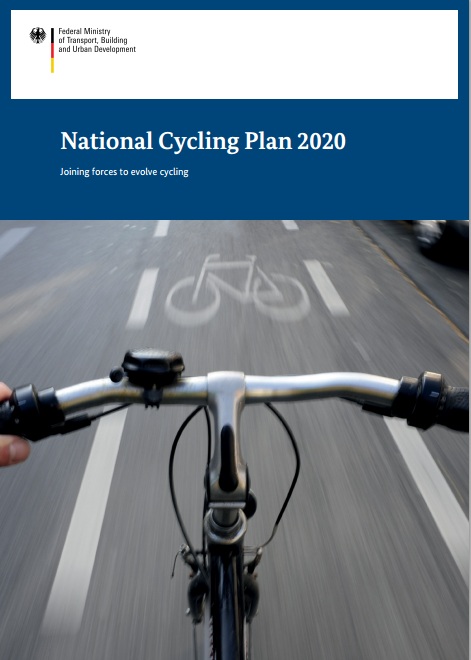
Taking the lead: national strategies on cycling
An increasing number of European countries have put in place and implemented national strategies on cycling. These documents are a sound basis for the development of cycling in European countries. ECF has collected information and best cases around Europe on a new webpage.
 The Danish cycling strategy. “A new cycling strategy for Denmark: Denmark on your bike!” Minsiter of Transport, 2012
The Danish cycling strategy. “A new cycling strategy for Denmark: Denmark on your bike!” Minsiter of Transport, 2012
When it comes to developing cycling in a city, support from local decision-makers and a city's administration is indispensible. But a little support from the national government is always welcome, and some matters have to be regulated at national level altogether, such as highways codes, fiscal incentives for commuting, VAT rates...
ECF therefore looked for the first time in a systematic way at national cycling policies. What we've found is that in 2015, twelve EU countries have already officially adopted a national cycling strategy and two other EU countries (Belgium and the UK) have other documents as a basis. In the United-Kingdom, official cycling strategies have been prepared at the sub-national level (in England, Scotland, Wales and Northern-Ireland) and in Belgium, the national cycling strategy has not been officially adopted by the government. In addition non-EU countries such as Norway and Switzerland have set national strategies on cycling.
A national cycling strategy, what for?
In the first place, national cycling strategies allow national governments to set a clear framework for the development of cycling in their countries. The framework ideally refers to the coordination of cycling policies (across vertical and horizontal government authorities), the exchange of good practice, the capacity building for local and regional authorities, the co-funding for investments in cycling infrastructure and the funding of pilot projects, research and awareness-raising campaigns. This way, national governments can send the signal to regional and local authorities that cycling matters and that it should be taken into account in public policies.
In addition, national cycling strategies can prepare the field for new national regulation, e.g. regarding amending the highway code, changing VAT rates or introduce fiscal incentives for commuting by bicycle. National cycling strategies are also a means to boost dynamics at the national level and in various cycling-related areas such as cycling tourism, intermodality, education or physical activity.
 German national cycling strategy: "National Cycling Plan 2020: Joining forces to evolve cycling", Federal Ministry of Transport, Building and Urban development, 2012
German national cycling strategy: "National Cycling Plan 2020: Joining forces to evolve cycling", Federal Ministry of Transport, Building and Urban development, 2012
National cycling strategies are increasingly numerous and they often set clear and ambitious goals for the future. Among the most cycling-enthusiastic countries, Ireland and the Czech Republic intend to multiply the cycling modal share by 5 and 4 respectively in approximately 10 years. Through ‘Ireland’s First National Cycle Policy Framework’ the Irish authorities want to make the cycling modal share rise from 2% in 2006 to 10% by 2020. Through the Czech National Cycling Development Strategy for 2013 – 2020, the Czech authorities apply the ‘Vision 25′: by 2025, cycling, walking, public transport and private cars should have the same modal share of 25% of the trips made in Czech Republic.
To implement the strategies, some countries allocate substantial amounts of money to the development of cycling. Unsurprisingly, the Netherlands and Denmark are the most generous. In 2010, Dutch authorities (national, regional and local) spent more than €24 per person in cycling projects and infrastructure while Denmark spent annually €12 per person (on average) in cycling-related activities between 2009 and 2014.
There are plenty of inspiring examples; who is next?
- Read more about national cycling strategies and find best cases here.
- Log in to post comments
Contact the author
Recent news!
Upcoming events
Contact Us
Avenue des Arts, 7-8
Postal address: Rue de la Charité, 22
1210 Brussels, Belgium









